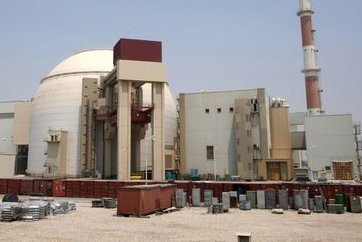
1 of 4 | An August 2010 photo shows an Iranian nuclear power plant in Bushehr that might be among targets if Israel Defense Forces strike Iran. File Photo by Abedin Taherkenareh/EPA-EFE
June 12 (UPI) — Israel Defense Forces launched early morning aerial attacks against dozens of nuclear sites in Iran on Friday to prevent the Islamic nation from developing nuclear warheads.
Iran has said its top commander in the Islamic Revolutionary Guard, Gen. Hossein Salami, along with some of the country’s top nuclear scientists, were killed in the strike.
The United States has denied any role in the strikes, but U.S. Secretary of State Marco Rubio said the Trump administration is in close contact with Israel and its allies.
“President Trump and the Administration have taken all necessary steps to protect our forces and remain in close contact with our regional partners,” Rubio said in a statement. “Let me be clear: Iran should nor target U.S. interests or personnel.”
A spokesperson for Iran’s Armed Forces, Gen. Shekarchi, said that Israel and the United States will “receive a forceful slap” and Iran’s Armed Forces are prepared to bring counterstrikes and promised that “a retaliation attack is definite, God willingly,” he said on state television.
Warning sirens sounded across Israel in anticipation of Iranian retaliation as the IDF attacks continued during the early morning hours on Friday, The Jerusalem Post reported.
The Israeli Air Force said it will continue the strikes against Iranian nuclear and long-range missile targets for several days.
“At the end of the operation, the will be no nuclear threat” from Iran, IDF officials told media.
“We are in the window of strategic opportunities,” the IDF said. “We have reached the point of no return, and there is no choice but to act now.”
Israeli Defense Minister Israel Katz declared a state of emergency throughout the country in anticipation of retaliatory attacks.
“Following the State of Israel’s preemptive strike against Iran, a missile and drone attack against the state of Israel and its civilian population is expected in the immediate future, Katz said.
Iran’s pursuit of a nuclear arsenal triggered the military strike by Israel as diplomatic efforts failed to divert Iran from its efforts to become a nuclear power.
“Weapons of mass destruction in the hands of the Iranian regime are an existential threat to the State of Israel and to the wider world,” the IDF said.
The action is being coordinated with the United States, according to the IDF.
The Israeli military strike against Iran would not be supported by the United States, NBC News, The New York Times and ABC News reported earlier on Thursday.
Earlier in the day, U.S. and Iranian representatives discussed a potential agreement that would enable Iran to enrich uranium for energy but not to produce nuclear weapons.
The Trump administration was awaiting a response from Iran regarding the potential agreement framework, but Iranian negotiators have become more “hardline” during the process, President Donald Trump said.
The hardline stance by Iranian leaders caused the Trump administration on Wednesday to order non-essential staff with the Defense and State departments to leave the Middle East due to reports of a pending Israeli strike on Iran.
Israeli Prime Minister Benjamin Netanyahu had pressured Trump to approve an Israeli strike against Iran before it produces a nuclear warhead and while Iran is vulnerable, The New York Times reported.
Trump says he prefers to negotiate a nuclear non-proliferation agreement with Iran, which Iran’s hardline stance made more difficult to achieve.
U.S. and Iranian negotiators were scheduled to meet in Oman on Sunday, but Trump has said Iran has adopted “unacceptable” negotiation demands.
Britain has announced new threats against commercial shipping in the Middle East, and Trump on Wednesday told the New York Post he has become less confident that Iran won’t pursue the development of nuclear weapons.
The U.S. Embassy in Jerusalem on Thursday limited movement by its employees in anticipation of a potential Israeli military strike against Iran and its uranium enrichment facilities.
Israel opposes any form of uranium enrichment by Iran, which the board of governors for the International Atomic Energy Agency recently concluded is not complying with existing nuclear agreements.
Iran’s military has begun drills that are aimed at targeting enemy movements after learning of the potential Israeli strike, The Jerusalem Post reported.
IAEA investigators found man-made uranium particles at three locations in Iran in 2019 and 2020 and in a recent quarterly report announced Iran has enough enriched uranium to develop nine nuclear warheads.
“We have been seeking explanations and clarifications from Iran for the presence of these uranium particles,” IAEA Director-General Rafael Grossi said.
“Unfortunately, Iran has repeatedly either not answered or not provided technically credible answers,” Grossi said.
Iranian officials have tried to sanitize the sites and thwart IAEA inspectors, he added.